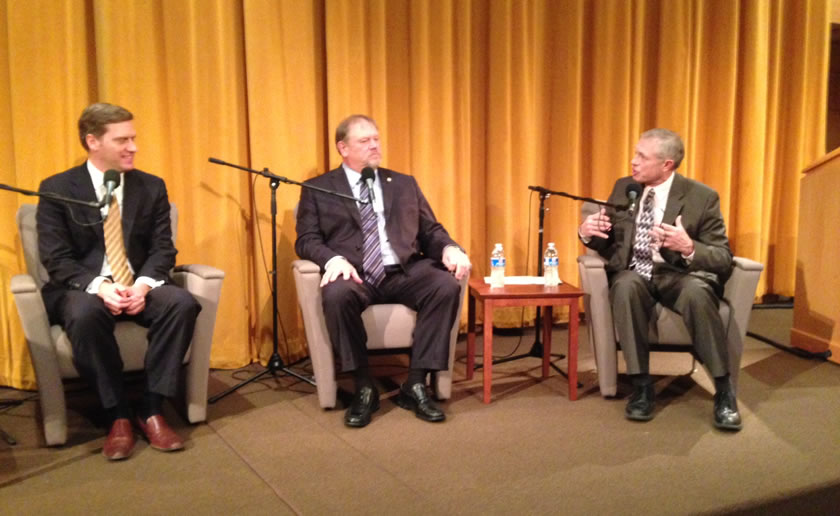

Share
DFL and Republican legislature leaders sought a tone of cooperation as the 2015 session opened this week – and also tried to dampen expectations.
“A lot of people are going to be disappointed” at the end of the session, Senate Majority Leader Tom Bakk, a DFLer from Cook, predicted at a forum Thursday sponsored by the Humphrey School of Public Affairs at the University of Minnesota. The event was moderated by former Minnesota House Speaker Steve Sviggum and Humphrey School Professor Larry Jacobs.
Bakk and Speaker of the House Kurt Daudt, a Republican from Crown, set a cordial tone in their remarks that echoed comments they had made earlier in the day at separate news conferences at the state Capitol.
“I’m very optimistic about our ability to work together,” Daudt said. Bakk noted the two planned to have lunch together after the forum and share information on bills being introduced.
However, after two years of DFL lawmakers controlling both houses of the Legislature and holding the governorship, the switch to a Republican majority in the House will clearly mean conflicts over issues such as the two-year state budget and transportation funding.
At the forum, neither lawmaker spoke at length on any particular issue, but they did offer some clues to their stances.
On transportation, Daudt said the Republican “priority will be on roads and bridges. I won’t say we won’t consider other things [but] we’ve got to focus on the basics.”
Bakk said DFLers want to see a comprehensive plan for roads, bridges and transit but he is “concerned” about proposals to fund it through an increase in the gas tax. Earlier in the day, the MoveMN coalition made such a proposal.
The Senate majority leader said he is cautioning Minnesotans against high expectations because passing a state budget will not be easy, despite a projected $1 billion surplus. The amount sounds like a lot, Bakk said, but is probably only enough to cover inflationary increases on the $40 billion budget.
On education, Daudt repeated his call for “reform” of teacher tenure and noted it was the topic of one of the first bills the GOP has introduced. He also said, “We want to put the best teachers in front of students,” adding “It may mean we have to look at paying teachers more.”
Bakk lauded the work done in the past four years to create a teacher evaluation program that began last fall. He said lawmakers should give the evaluation program time to work before proposing changes.
Denise Specht, president of the 70,000-member Education Minnesota union, issued a statement Thursday praising the Senate for its education agenda and expressing disappointment in plans announced by the House.
“The Senate is addressing some of the most pressing needs of Minnesota students and their families by expanding access to pre-kindergarten programs, vocational and technical education and mental health services in rural areas,” Specht said.
“In contrast, the House education agenda apparently consists of new layoff regulations for teachers and a package of policies around the licensing of educators that may make it easier for less-qualified teachers to get into Minnesota classrooms,” Specht said. “There’s a huge gap between these policies and the challenges educators and parents see in their schools every day. I hope House leaders will work with educators this session and aim a little higher.”

